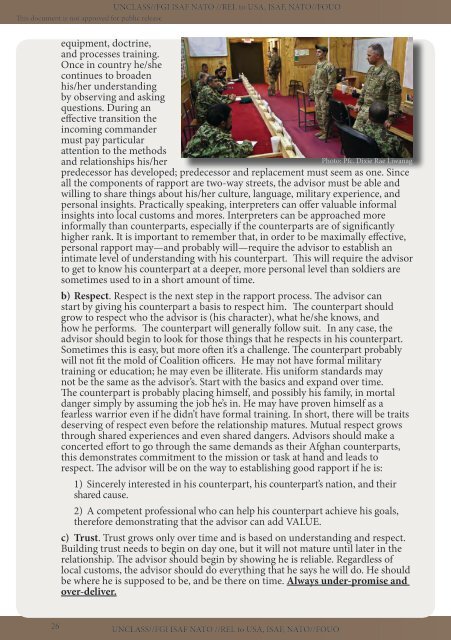20140927_NIU_CJ7_TREX_SFA guide 3.1
20140927_NIU_CJ7_TREX_SFA guide 3.1
20140927_NIU_CJ7_TREX_SFA guide 3.1
Create successful ePaper yourself
Turn your PDF publications into a flip-book with our unique Google optimized e-Paper software.
UNCLASS//FGI ISAF NATO //REL to USA, ISAF, NATO//FOUO<br />
This document is not approved for public release<br />
equipment, doctrine,<br />
and processes training.<br />
Once in country he/she<br />
continues to broaden<br />
his/her understanding<br />
by observing and asking<br />
questions. During an<br />
effective transition the<br />
incoming commander<br />
must pay particular<br />
attention to the methods<br />
and relationships his/her<br />
Photo: Pfc. Dixie Rae Liwanag<br />
predecessor has developed; predecessor and replacement must seem as one. Since<br />
all the components of rapport are two-way streets, the advisor must be able and<br />
willing to share things about his/her culture, language, military experience, and<br />
personal insights. Practically speaking, interpreters can offer valuable informal<br />
insights into local customs and mores. Interpreters can be approached more<br />
informally than counterparts, especially if the counterparts are of significantly<br />
higher rank. It is important to remember that, in order to be maximally effective,<br />
personal rapport may—and probably will—require the advisor to establish an<br />
intimate level of understanding with his counterpart. This will require the advisor<br />
to get to know his counterpart at a deeper, more personal level than soldiers are<br />
sometimes used to in a short amount of time.<br />
b) Respect. Respect is the next step in the rapport process. The advisor can<br />
start by giving his counterpart a basis to respect him. The counterpart should<br />
grow to respect who the advisor is (his character), what he/she knows, and<br />
how he performs. The counterpart will generally follow suit. In any case, the<br />
advisor should begin to look for those things that he respects in his counterpart.<br />
Sometimes this is easy, but more often it’s a challenge. The counterpart probably<br />
will not fit the mold of Coalition officers. He may not have formal military<br />
training or education; he may even be illiterate. His uniform standards may<br />
not be the same as the advisor’s. Start with the basics and expand over time.<br />
The counterpart is probably placing himself, and possibly his family, in mortal<br />
danger simply by assuming the job he’s in. He may have proven himself as a<br />
fearless warrior even if he didn’t have formal training. In short, there will be traits<br />
deserving of respect even before the relationship matures. Mutual respect grows<br />
through shared experiences and even shared dangers. Advisors should make a<br />
concerted effort to go through the same demands as their Afghan counterparts,<br />
this demonstrates commitment to the mission or task at hand and leads to<br />
respect. The advisor will be on the way to establishing good rapport if he is:<br />
1) Sincerely interested in his counterpart, his counterpart’s nation, and their<br />
shared cause.<br />
2) A competent professional who can help his counterpart achieve his goals,<br />
therefore demonstrating that the advisor can add VALUE.<br />
c) Trust. Trust grows only over time and is based on understanding and respect.<br />
Building trust needs to begin on day one, but it will not mature until later in the<br />
relationship. The advisor should begin by showing he is reliable. Regardless of<br />
local customs, the advisor should do everything that he says he will do. He should<br />
be where he is supposed to be, and be there on time. Always under-promise and<br />
over-deliver.<br />
26<br />
UNCLASS//FGI ISAF NATO //REL to USA, ISAF, NATO//FOUO


